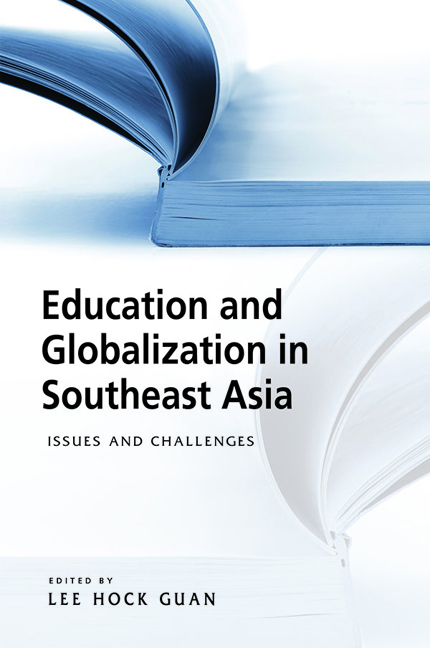Book contents
- Frontmatter
- Contents
- Acknowledgements
- Contributors
- Introduction
- 1 English in Singapore and Malaysia: Common Roots, Different Fruits
- 2 Globalization, Educational Language Policy and Nation-Building in Malaysia
- 3 Second-Order Change Without First-Order Change: A Case of Thai Internationalization of Higher Education
- 4 Higher Education in Malaysia: Access, Equity and Quality
- 5 Indonesian Higher Education: Gaps in Access and School Choice
- 6 Increasing Access to and Retention in Primary Education in Malaysia
- 7 Primary and Secondary Education in Myanmar: Challenges Facing Current Reforms
- Index
5 - Indonesian Higher Education: Gaps in Access and School Choice
Published online by Cambridge University Press: 12 January 2018
- Frontmatter
- Contents
- Acknowledgements
- Contributors
- Introduction
- 1 English in Singapore and Malaysia: Common Roots, Different Fruits
- 2 Globalization, Educational Language Policy and Nation-Building in Malaysia
- 3 Second-Order Change Without First-Order Change: A Case of Thai Internationalization of Higher Education
- 4 Higher Education in Malaysia: Access, Equity and Quality
- 5 Indonesian Higher Education: Gaps in Access and School Choice
- 6 Increasing Access to and Retention in Primary Education in Malaysia
- 7 Primary and Secondary Education in Myanmar: Challenges Facing Current Reforms
- Index
Summary
INTRODUCTION
Most research on school choice and academic achievement focus on the outcome in terms of either standardized exam scores or upper secondary graduation. However, instead of using these measures some economists place more emphasis on higher education attendance as an indicator of school performance. Using various methods, numerous studies have analysed the effect of school choice on secondary school and higher education or college attendance. A significant proportion of these studies focused on and evaluated the performance of Catholic, private and public secondary schools.
Some studies in developed countries have found that Catholic or private schooling has a positive effect on academic achievement or earnings. Evans and Schwab (1995) found that attending a Catholic high school increases the probability of graduating from high school or participating in a four-year college course by 13 percentage points. Likewise, Neal (1997) found that urban minorities benefit greatly from attending primary Catholic schools as their probability of high school and college graduate rates increased. Vella (1998) also found that, despite the tuition fee being relatively low, attending an Australian Catholic School increases the probability of access to higher education and higher earnings. Using a quantile regression approach, Eide, Goldhaber and Showalter (2004) found that students attending a Catholic high school in the United States will more likely lead to attendance at a selective four-year college relative to students attending public high schools. Altonji, Elder and Taber (2005) developed a new technique of assessing selectivity bias in the absence of valid instruments based on measuring the ratio of selection on unobservable variables to estimate the effect of attending Catholic school on college attendance. They found that Catholic high school attendance substantially increases the probability of college attendance.
However, other research have found contradictory evidence. Akabayashi (2006) shows that in Japan public schools outperform private schools on college attendance rates when competition is increased. Cappellari (2004) found that general high school attendance increases the probability of access to university, whereas private high school students have lower academic performances. Similarly, Stevans and Sessions (2000) found that school choice has different implication for white, black or Hispanic students, as school choice is mostly taken advantage of by white urban residents. Moreover, white students perform better in private schools than in public schools, whereas a performance gain for private school minority students is found to be significant.
- Type
- Chapter
- Information
- Education and Globalization in Southeast AsiaIssues and Challenges, pp. 111 - 141Publisher: ISEAS–Yusof Ishak InstitutePrint publication year: 2017



